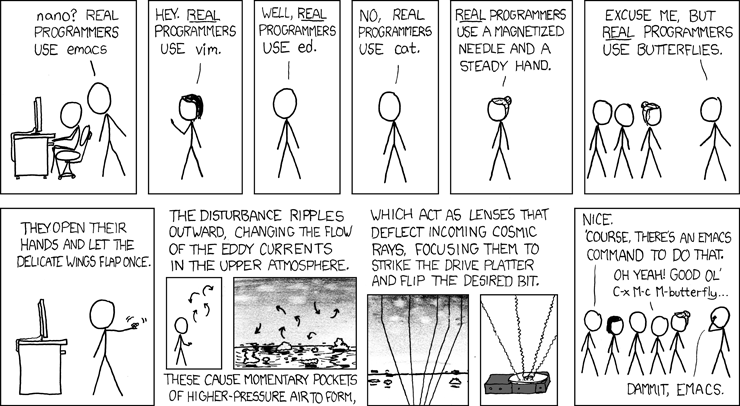The field of computer science, and technology in general, encompass many, many people, all with their own experiences, beliefs and preferences. Pick any two people who experiment with technology in a personal or professional sense, and their origin stories are probably going to be different, with elements unique to themselves. Given this broad array of perspectives, it should come as no surprise that when discussing the best tool for the job, or the best approach to a problem, people disagree.

Frequently though, those opinions collide, with sometimes painful results. When we’ve formed an opinion on a subject, through a combination of knowledge in the field and our own lived experiences, it can be an incredibly personal decision. Although we may all, logically, know that our own opinion is not always the best opinion, to us it certainly feels like the best.
It’s the opinion that, based on what we’ve experienced and based on what we know, seems right. We’re practically weighing who we are as a developer on the concept of “I know what’s going on here, and I’m right about it!” So of course it’s going to be a very strong opinion — and it’s entirely okay to want to back up an opinion, to want to argue about it and debate on it, to want to convince others that the way we see an issue is the way it should be seen.
But even though everything in us wants to be right, it’s important to remember that the other person in any argument feels the same way. As strongly as we want to express that, based on how our experience and knowledge has influenced us, we feel the solution we present is the best one, there’s another person with their own experience, their own knowledge, who’s come to a different conclusion.
It’s Okay to Disagree. Really.
When someone disagrees with us, it’s easy to immediately feel attacked. To feel like, when they disagree with our opinions, they’re disagreeing with us as a person. After all, we’ve put our experience, our beliefs, our being into why we feel our side is correct; to say otherwise is an affront to who we are. It’s saying “Your experiences don’t matter,” isn’t it?
While it is the case that some people are going to disagree by going “I’m right, end of story”, it’s frequent that instead we’ll be met by people who value our opinion and insight. When blended with their experience, however, they come to a different conclusion. By disagreeing and explaining their viewpoint, they may actually be saying, “My experiences matter, but so do yours. Help me understand where you come from on this.”
It’s Okay to Separate a Person from Their Ideas.
To disagree with someone in a non-hostile way, or to allow someone else to disagree with us, it’s important to also remember: Especially when it comes to solving a problem, a person is not their ideas, and objecting to an idea does not always mean objecting to the person who presented it.
If someone tells us they think the way we’re solving a problem is wrong, that doesn’t mean they think less of us. It doesn’t mean they don’t feel like our opinions are valid, and as we know, it doesn’t mean they think our knowledge and experience doesn’t matter. It simply means that, given the same problem, they’ve come to a different conclusion. That someone else resolves a problem differently doesn’t mean our solution is any less valid, and definitely doesn’t mean that we as a person are less valid. The world’s most esteemed, smartest people aren’t always right; nobody is — in any problem we solve, there’s going to be scenarios we didn’t account for, aspects of the issue we shrugged off as not important enough to account for, and so on.
Just because someone else finds a new scenario, or comes up to say they feel something is more important than we believe it is, that doesn’t mean they’re against us. That doesn’t mean they think less of us, or think our input isn’t valuable. It just means they disagree. And the same goes in the other direction: we can disagree with someone else’s solutions without insulting them as a person. We can disagree with others, and if the the situation is appropriate, we should disagree with others; but when disagreeing, we need to remember we’re talking about the idea, not the person we disagree with.
It’s important to keep in mind, although our experiences lead us to a different result, and we may be offended or hurt if someone disagrees with us, the same goes for them — their solutions and ideas are influenced by their personal journey and their understanding. Criticism, talking about why we disagree with each other, is a beneficial and wonderful way to open doors to a broader discussion, one that can help enlighten everyone involved. But ensuring that criticism is constructive, not negative, is essential to helping us and the other person feel comfortable in opening up about the subject; negative criticism, especially if it’s only negative criticism, can come across as attacking them for their ideas, not just conversing about the idea itself.

It’s Okay to Talk it Out.
The fact is, sometimes turning a disagreement into a debate isn’t worth it. We see these all the time in technologic discussions; “Why are you using Vim? Emacs is so much better,” “Windows? WTF? It doesn’t matter that you find Windows easier, Linux is freedom and Linux is just the best,” and so on. There’s hundreds of personal taste arguments like these; it’s still okay to disagree. It’s alright to say we prefer Linux, and carry on our day — we shouldn’t feel attacked because someone else chose not to convert to our blessed choice, and we shouldn’t attack someone else for not converting. But these aren’t the the hills to die on; our life and our projects aren’t going to drastically change because someone else switched to Linux or traded in their ~/.emacs file for a ~/.vimrc.
But at the same time, some debates can be worth it. When we’re working together with other people, we’re opening doors for collaboration, and with collaboration comes disagreements, different opinions, and different experiences being applied to solve the same problems. When we’re working together with others, we won’t always come to the same solutions. We’re going to apply different skillsets, different experiences, and different pools of knowledge to tackle an issue, and there’s a very good chance that we’ll reach conclusions in different ways.
Because of this, being able to talk about our thoughts is intensely valuable. Everybody involved won’t agree with every result, and that’s fine. But it’s okay to disagree. We can say, “I feel like the better solution is…” without saying, “You’re wrong.” Being open to debating an issue, even an issue everyone involved feels passionate about — without taking it personally, without permanently bonding our idea to our sense of self — opens doors for a wealth of insight from other experiences and other people. Just because someone critiques our ideas doesn’t mean they’re critiquing us, and doesn’t mean we’re a worse person for being critiqued. It simply means they came to a different conclusion, one which very possibly could help shed light on a part of the problem we glossed over.
It’s Okay to be Wrong.
Lastly, it’s okay to admit we weren’t right. Everyone makes some mistakes: we might have skipped over an edge case we didn’t feel was important; skipped factoring in a way to use something; possibly tested something wrong; we may have made something great, but not thought about everything that could happen. There’s hundreds of ways people mess up, but everyone does it. Nobody is perfect, and nobody can be perfect all the time.
The important thing to remember is that our value isn’t tied to being right every single time, and nobody expects us to always be right. Our value, our self-worth, it’s not being perfect, and the same goes for everyone else. Not every argument needs to be won, and not every debate need be settled in our favor. If we can use our experience to drive something forward, great; if we can work with someone else, talk out the differences in our opinions, and compromise on a solution where we both can win, awesome; and if we’re wrong, oh well. At the end of the day, we’ve learned something new and gained a deeper appreciation for the subject at hand, and that in itself is a valuable thing.
We don’t need to just accept that we’re wrong every time, and nobody should expect us to, just as we shouldn’t expect everyone else to accept that we’re right every time. But sometimes, we will be wrong, and when that happens: it really is okay. We can learn and evolve our thoughts, we can walk away thinking, “Maybe I still don’t entirely agree, but this was a good thing to understand more about later on.” We aren’t less of a person, we aren’t less valuable, we didn’t ruin someone else’s day by disagreeing with them. We were just wrong, and that’s fine.
Seriously. I Promise. It’s Okay to Disagree.
If anyone can take four words with them, it’s that it’s okay to disagree. To debate, to argue, to try to express why our knowledge and experiences lead us to an idea or a solution, it’s a part of human nature. It’s who we all are to want to validate ourselves through our opinions and through the solutions we find, but it’s okay for someone else to come to a different conclusion. And it’s okay to say we disagree, just as it’s okay for someone else to disagree with us. We don’t need to attack someone for their conclusions, and we shouldn’t feel attacked solely because someone else feels like the conclusion we reached doesn’t match up with theirs.
Done respectfully, disagreeing, arguing, debating, opening a discussion: It’s okay. It’s fine. And we should all learn to do it more.
